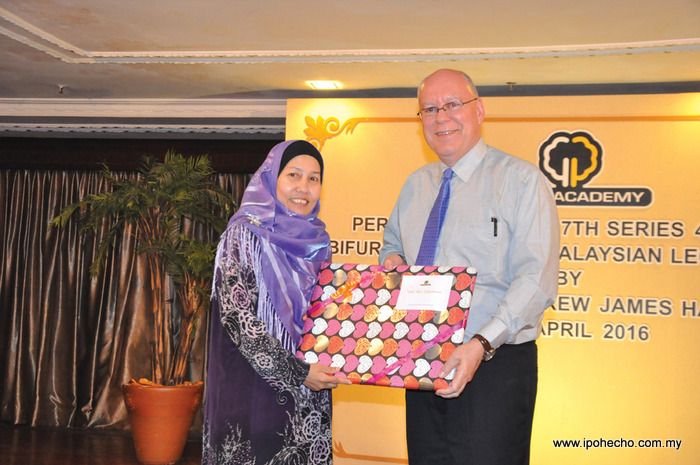



With Dato’ Ab Wahab bin Dato’ Seri Azizul Hassan, the Territorial Chief of Kinta as its guest of honour, the dinner talk was held on Saturday, April 2 at Syeun Hotel. In its 17th year, this was the fourth talk of the series.
At the beginning of the programme, the audience of over 150 observed a minute of silence for the late Dato’ Reverend Brother Vincent Corkery. “He was one of our earliest speakers way back in 1999,” Dato’ Dr Ramanathan Ramiah, the master of ceremonies stated.
Deputy Chairman of the Perak Academy and an eminent lawyer himself, Chan Kok Keong in his introduction of Professor Harding, said, “Inspired by the late Professor R.H. Hickling, who drafted so many of the laws of our country when he was parliamentary draftsman, Andrew’s career spans three decades in four continents. From his birthplace in the United Kingdom, he has also taught in Singapore, Australia and Canada.” One of Andrew’s books entitled, “Law, Government and the Constitution in Malaysia” is used as a textbook in many university courses in Malaysia.
Regarding his interest in Malaysia, this was what Andrew said, “It was Hickling who piqued my interest first in Malaysia. It’s such a fascinating multicultural community with so many interesting issues. When you’re engaged with a country and its people as a scholar for such a length of time, you grow to love them. I’ve been coming to Malaysia since 1974 and over that entire period I’ve always been treated with a huge amount of respect, hospitality and love.”
In 1988, there was a significant amendment to our Federal Constitution namely, Act A704, which drew a line between our civil and syariah courts.
“Actually, if you take East Malaysia into account, you might even say it is trifurcated because they’ve systems of Native Courts,” Andrew highlighted. According to him, legal pluralism, in the official sense, offers a workable way of compromising between these two extremes.


“Take the recent example of S. Deepa’s case this year where the critical issue was whether custody of two children should be given to their father who converted to Islam or their mother who remained a Hindu. The Federal Court granted custody of the older child, a boy to the father and the younger child, a girl to the mother, based on the perceived interest of each child. In the process, the court held that Civil Court orders prevail over Syariah Court orders. This is a very important decision by the Federal Court that has huge implication for the bifurcated legal system. In that case, the two systems cannot be strictly equal,” he explained.
Present at the lecture was Indira Gandhi, a mother who fights for the custody of her three children when her estranged husband decided to convert to Islam, and in the process inducted their kids into the religion unilaterally. Her lawyer, M. Kulasegaran was also in attendance.
Perak Academy is a non-profit and apolitical organisation dedicated to achieve its objectives through a variety of different approaches, working closely with all like-minded bodies including government agencies. The academy believes that the Perak state potential can be dynamic.
The patron of the organisation is Sultan Nazrin Shah. Since its establishment, Perak Academy has hosted and will continue to host bimonthly lectures by inviting professionals here and from abroad to speak on subjects related to their expertise and interest. For more information, visit www.perakacademy.com.
Mei Kuan


